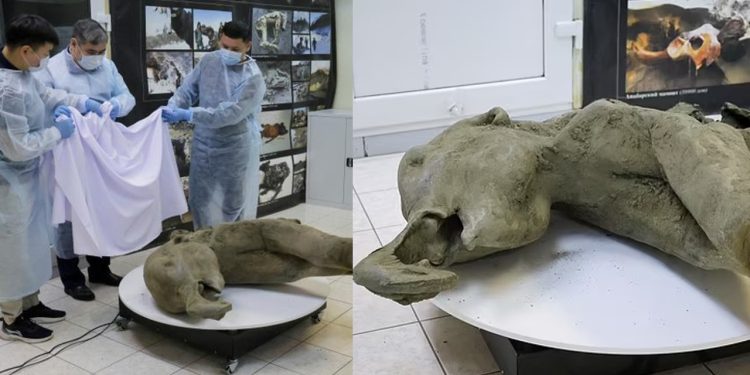Jakarta, Indonesia Sentinel — Russian scientists have uncovered an exceptionally well-preserved baby mammoth estimated to be around 50,000 years old in Yakutia, Siberia. The mammoth, named Yana after the river near its discovery site, is considered one of the most significant finds in paleontological history.
Yana, a female mammoth calf, is one of only seven fully intact mammoth carcasses ever discovered. The remains were found near the Batagaika research station, a region already known for yielding prehistoric remains, including those of horses, bison, and lemmings.
Before Yana’s discovery, only six fully preserved mammoth carcasses had been found globally—five in Russia and one in Canada.
Weighing approximately 180 kilograms (397 pounds), standing 120 centimeters (3.9 feet) tall, and measuring 200 centimeters (6.5 feet) in length, scientists estimate Yana was about one year old or slightly older at the time of her death.
“We were all astonished by the extraordinary level of preservation,” said Anatoly Nikolayev, Rector of North-Eastern Federal University, in an interview with The Guardian on Monday, December 23.
The carcass was first displayed at North-Eastern Federal University, drawing significant attention from researchers and the public alike.
Siberia Permafrost
The Yakutia region in Siberia often described as a giant natural freezer, has played a crucial role in preserving prehistoric remains. According to Reuters, Yana was discovered in the Batagaika Crater, an 80-meter-deep depression that continues to expand due to climate change-induced permafrost thawing.
Maxim Cherpasov, head of the Lazarev Mammoth Museum Laboratory in Yakutsk, stated that preliminary observations suggest the mammoth was over a year old at the time of its death. However, further tests are needed to confirm this.
“It’s incredibly rare to see such preservation, especially with the head and trunk still intact,” Cherpasov explained. “Usually, these parts are the first to degrade or are consumed by modern predators and birds. In this case, while the front legs show some damage, the head remains remarkably preserved.”
Ancient Saber Toothed Kitten Mummy Discovered, Perfectly Preserved after 35,000 years
This discovery adds to a growing list of spectacular finds from Siberia’s permafrost. Just last month, scientists in the same region—known locally as Sakha or Yakutia—unveiled the 35,000-year-old remains of a saber-toothed cat cub, while earlier this year, they discovered a 44,000-year-old wolf carcass.
The discovery of Yana offers valuable insights into Ice Age ecosystems, while also underscores the importance of preserving Siberia’s permafrost regions as climate change accelerates their thawing.
(Raidi/Agung)

























